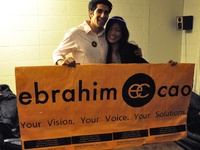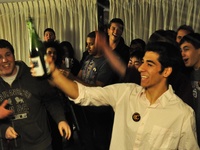
Senan Ebrahim ‘12 raises of bottle of apple cider to all the supporters of his campaign after learning that he won the election for president of the Undergraduate Council last night.
A year after scandal and accusations marred the 2009 Undergraduate Council presidential elections, Senan Ebrahim ’12 and running mate Bonnie Cao ’12 were elected to lead the UC on Thursday, ending a relatively quiet race marked by a face-off between two insider tickets with strong histories of leadership on the Council.
Cao and Ebrahim were given first-place votes on 45 percent of the 3,595 ballots filed, and achieved a majority when the votes of the third-place ticket, Collin A. Jones ’12 and Peter D. Davis ’12, were re-allotted according to the Council’s Hare-Clark voting system.
The second-place ticket of Matthew S. Coe-Odess ’12 and Tengbo Li ’12 trailed this year’s victors by a margin of 567 votes in the final tabulation. The election saw a turnout on par with the balloting in 2009 and 2008, which recorded poll numbers of 3,792 and 3,642 respectively after registering an all-time low in 2007.
Over the course of the two-week campaign, the momentum swung largely toward the Ebrahim-Cao camp, which captured the endorsements of 24 student groups—including the Chinese Students Association, Fuerza Latina, Queer Students and Allies, and the Harvard College Democrats, a traditional bellwether that had endorsed the winning candidate in each of the previous seven years.
By contrast, Coe-Odess and Li won the approval of six smaller student groups and Pinocchio’s Pizza & Subs.
Ebrahim and Cao also gained the support of the majority of the freshman UC representatives prior to the election. The freshman vote was a focus of the campaign, according to Cao, who indicated that freshmen were expected to vote in greater numbers than upperclassmen.
Earlier this week, Cao indicated that eight of the 12 freshmen on the Council had thrown their weight behind the Ebrahim-Cao ticket.
Social life remained the main focus of all three campaigns and dominated the two public debates this year. Both Ebrahim and Coe-Odess have touted their experience working on the issue—Ebrahim as Student Life Committee Chair and Coe-Odess as the Social Life Task Force Chair—and offered similar solutions, including increased use of House common spaces and school-wide social events.
But student group leaders pointed to the realistic promises on the Ebrahim-Cao platform—including an expansion of the UC’s recent pilot program to help student groups rent out large or off-campus venues and further work on inter-House dining—as a major reason for their endorsement.
Ebrahim and Cao have similarly focused on the expansion and revamping of existing initiatives, promising to work on Optional Winter Activities Week programming for the College’s January break between semesters and to improve campus applications such as Shuttleboy, which tracks campus shuttle buses.
“I feel like both tickets propose a lot of the same things. That’s probably because both tickets are UC insiders,” said Kwang “Joseph” Y. Kim ’12, Ebrahim-Cao’s campaign manager. “They’ve already been working on projects that they know are feasible and they can deliver once they get into office.”
The feasibility of some of Ebrahim-Cao’s other promises remains to be seen. Largely unprecedented projects include the recognition of campus Greek life, extension of the deadline for changing course registration to pass-fail, and a shopping week that would allow students to scout different teaching fellows before finalizing their section assignments.
Throughout the campaign, Ebrahim and Cao pegged as their most innovative initiative their proposed “Forum for Change,” a new program that would bring together student activists with administrators and faculty members close to their area of concern. In interviews over the past two weeks, Ebrahim pointed to the Forum initiative as an example of his ability to capitalize on the strength of his existing relationship with key College administrators, who he said have shown support for the Forum.
Both the Coe-Li and Jones-Davis tickets offered congratulations to Ebrahim and Cao last night, expressing their faith in the pair’s ability to lead the Council in the coming year.
“We said we had a 40-60 chance and it was 42-58,” Coe-Odess said. “We started two years behind them. We got a late start, had a smaller staff. I think the stronger ticket won, and we’re holding our heads high.”
Read more in News
Police Arrest 2 Individuals After Robberies














